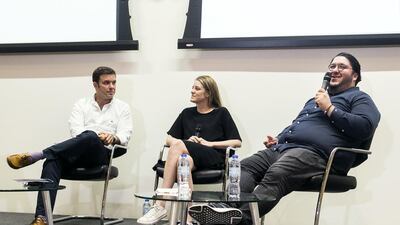“Nothing is an easy sell in the start-up world,” says Sarah Jones of Mini Exchange, an online marketplace for childcare products.
The British entrepreneur launched her e-commerce venture three years ago and admits in the early days she had a lot to learn.
“I didn’t even know what a conversion rate was when I started,” she says. “I thought if 100 people came to my site, 50 per cent would buy. Actually a good conversion rate is out of every 100 coming to the site, only one will buy. Getting my head around that was a huge challenge.”
Ms Jones was talking at the launch of New York University Abu Dhabi’s (NYUAD) new startAD programme, which offers aspiring entrepreneurs a range of free workshops, talks and boot camps to help turn their business ideas into reality.
The new innovation and entrepreneurship programme is taught by NYUAD professors, UAE-based entrepreneurs and global experts. It includes Tech Tuesdays, which tackle the theme of how to create viable products from scientific research, undertaken in the realms of health, social robotics, fintech, artificial intelligence and virtual reality. All-day digital and business literacy programmes are offered on Saturdays. “It’s about building up the innovation ecosystem in Abu Dhabi,” explains NYUAD’s vice provost for innovation and entrepreneurship and managing director of startAD, Ramesh Jagannatham. “The government has invested in the university, and now it’s our turn to reach out to the community. The 21st century is the age of the entrepreneurial economy and we’re going to lead the way.”
At the launch of the series last month, Ms Jones was one of three entrepreneurs based in the UAE grilled on stage on the lessons they have learnt from their business failures.
Also on stage was David Llorente, the founder of the Abu-Dhabi based Artificial Intelligence (AI) company Narrativa, which transforms data into content. He says his biggest challenge is overcoming the suspicion from those in the media concerned about potential job losses.
“The adoption of these technologies is very slow in the media industry because there is a lot of resistance, especially in Europe,” says Mr Llorente. “We need to explain that we are not destroying jobs, but increasing revenues and profit capabilities of companies.”
Narrativa is the fourth start-up Mr Llorente has launched, and he admits most didn’t work out. “But when it does work very well, then you have a whole new problem because you have to generate customers and deliver, so you increase your burn rate – meaning how quickly you’re burning through your capital,” he says. “And then you need to keep the burn rate at the level you can afford. Before you run out of money, you need to create capital to take the company to the next level.”
Ms Jones, who left a lucrative banking job in mergers and acquisitions to launch Mini Exchange, has just closed a US$3 million round of investment.
She says that although the cost of starting up a business in the UAE is “super-high”, once established running costs are much lower than elsewhere – “as long as you’re not hiring and firing staff every day”, she concedes. “Here you have the advantage of no taxes and access to relatively cheap labour.”
The Iranian-German Alborz Toofani launched Snappcard, a mobile app that allows you to carry all your loyalty cards in one app, in Dubai in 2012.
Mr Toofani scaled Snappcard over three years by raising money in six smaller rounds of investment. “In hindsight, that wasn’t the right thing to do”, he admits – “but it was the only thing I could do back then. There was no institutional money, and until this day I’m not a big believer in institutional money in this region. Having to fundraise six times was a lot of work, as the sole founder.”
Mr Toofani recalls there were nervous moments when cash flow was running short. “There were times when it was me and three staff surviving for a month or two by just using credit cards. We are now about 30 in the team, so we won’t survive even a month if we run out of money.”
All three entrepreneurs agree though that their biggest business mistake was hiring the wrong people. “I hired somebody 15 years older than me and it didn’t work out because he didn’t represent the culture of the team”, says Mr Toofani. “Later, when I hired my managing director to develop the business in Turkey, he was a rock star when I hired him. But when he got to hire six more people, I realised he couldn’t manage a team. I had to act fast, and it was hard because he’d been working hard for two years and had invested equity.”
NYUAD’s next session on October 4 will look at the legal challenges of starting up in the UAE.
business@thenational.ae
Follow The National's Business section on Twitter

